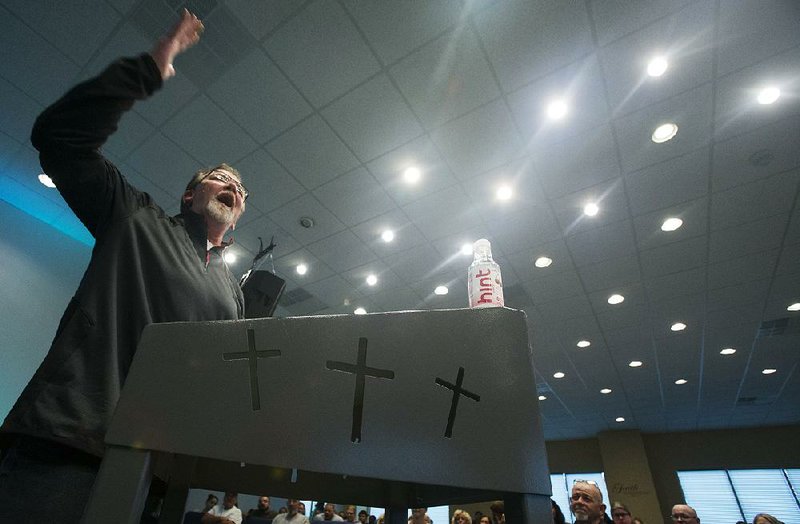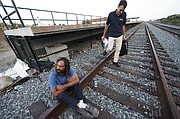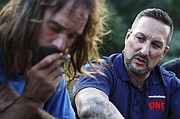Sidewalk prayers near shoot-up spots. Sunday sermons in the back of a bar. Pleas to struggling souls to surrender to God. Funerals for members of their flock who didn't make it.
Clergy members have become spiritual first responders in the opioid crisis, often leaving the pulpit to minister on the streets.
They can be reverends, rabbis, priests or pastors. Though their faiths differ, they invariably approach people with addiction as equals. No Bible-thumping, no blaming. Quite a few are in recovery themselves.
Despite some signs of a slowdown, the nation's all-time deadliest drug overdose epidemic endures. Opioids were involved in most of the deaths, killing nearly 48,000 people last year.
A spiritual element to recovery is familiar to people who have worked 12-step programs, with their references to an undefined higher power. Scientific studies have found evidence that religious faith can help substance abusers with their recovery.
Working with addicted people means trips to hospital rooms and fresh graves. But there are flashes of light in the darkness, too.
CHURCH FOR IMPERFECT PEOPLE
Nine minutes into his sermon, the Rev. Brad Hill made a confession.
"I gotta be honest. I ask myself a lot of the times, 'God, why did you allow me to be an addict?'" Hill says from the pulpit of his Grace Downtown Church. "Why are my friends dying of an overdose? ... I gotta ask God, 'Why, God, do you allow this?'"
Hill hears those questions a lot.
The church Hill started in the back of a Winchester, Va., bar moved this year to a space that can accommodate hundreds, many trying to turn the page on their addictions. Six and a half years in recovery, Hill calls it a totally judgment-free zone, "a church for imperfect people."
Hill has a salty beard, smiling eyes and booming voice to sermonize about the suffering he sees so often in the Shenandoah Valley. His phone lights up constantly with messages from struggling people and their loved ones. One recent text read: "Do those who commit suicide still go to heaven?"
Too often, Hill speaks at funerals for overdose victims, three in the past three months alone. He honors the dead while telling survivors, "You don't have to be like this person. There is a way out."
A funeral in September for a 38-year-old married father of four was especially hard on Hill. They were friends, and Hill had been talking to him about his struggle just a week before he died. It was Hill who welcomed the man's grieving family to a Sunday service.
"They lost one of ..." Hill swallowed, clapped his hands together twice, and continued in a softer voice. "They lost one of my favorite people. So I just ask that we pray real quick for them, OK?"
Hill's own addiction to painkillers led to a prescription fraud conviction in 2007 and a yearlong jail sentence that cost him a thriving church in Virginia Beach, Va.
About four years ago, he went to Winchester and started Sunday services in the backroom of a downtown bar called Brewbaker's for a handful of people struggling with addiction. They'd drop a sheet over the liquor bottles before services.
It grew by attracting people like Matthew Fanning, who met Hill at a Narcotics Anonymous meeting.
Hill would talk about spirituality, but Fanning wasn't ready to hear it until he relapsed into heroin addiction. Hill visited him in rehab in 2015, encouraged him and gave him Bible-based homework.
Fanning is now in recovery and a Grace Downtown regular.
"You don't have to come in your quote-unquote Sunday best," Fanning said. "You come as you are, whether you're struggling, or whether you don't believe, or whether you're just curious."
The nondenominational church moved this year to a nearby strip mall with room to seat 400.
While some churches merely welcome the homeless, Grace Downtown picks them up in a van. Other worshippers come from local rehabilitation centers. Hill estimates that more than half who show up on Sundays are in recovery or related to someone who is.
"I have folks that come in that just got high the night before," Hill says. "I've got folks that overdosed the night before. I've got folks who have lost everything."
GETTING THEIR HANDS DIRTY
The Rev. Jamie Casey prays with addicted people all over New Bedford, Mass. He joins hands with them in their living rooms days after overdoses, in hospital emergency rooms and on sidewalks in front of wind-beaten houses in this struggling city.
The 45-year-old associate pastor in a nondenominational church is part of a team of clergy from a variety of faiths who regularly crisscross town with police officers and counselors. Their goal is to get people into treatment and, if they will listen, to offer some spiritual advice.
"Surrender," Casey told Brian Peets, who stepped out from his makeshift shelter beneath a railroad track platform.
"I can't," Peets said.
"Surrender."
"I can't right now."
"Surrender," Casey repeated, alluding to his own addictions that started with alcohol and cocaine.
"For 20 years I fought and fought and fought against myself. Because you're your biggest enemy. You know that, right?" he told Peets. "So what ended up happening is that I ended up in a place that I lost almost everything. But then I had to surrender to this addiction, surrender to my circumstances, surrender to myself and then surrender to God."
New Bedford logged 56 opioid-related overdose deaths last year, a per-capita rate a third higher than nearby Boston. Police hope such outreach ride-alongs can get struggling people into treatment before the next setback.
The three-person teams cold-call houses where there have recently been overdoses to see if anyone wants help.
On a recent evening, Casey put on his shirt with "CHAPLAIN" on the back to ride with Officer Scott Carola and counselor Peter Lagasse around the city in an unmarked car.
Casey had a list of addresses of recent overdoses. But when they knocked on doors, most people either weren't home or weren't answering.
The trio was unfazed.
The person who ignores you today might embrace you tomorrow, said the Rev. David Lima, who heads the Inter-Church Council of Greater New Bedford and directs the program.
Only a small percentage will get treatment, but participating clergy contend that it's about more than numbers. Says Rabbi Raphael Kanter, quoting the Talmud, "if you save one life, it's as if you've saved the whole world."
They spotted James Sessine talking to friends on a busy corner outside a food market. The 29-year-old has struggled with addiction and recently has been living in a tent.
Sessine's friends scattered as the car stopped, but he stayed and listened to Casey's suggestion that he get a treatment slot.
Casey called a provider. Can they give him a time tomorrow? Yes.
Sessine got on the phone and promised he'll be ready the next morning, meanwhile, "I'm going to walk around all night, like I do every night."
Sessine ended the call and hugged Casey.
"I shoot heroin daily," Sessine explained a few minutes later, "and it's coming to the point where enough is enough."
Casey says his preaching, teaching and intervening is all part of his goal to "love people back to life."
"My best friend and I, we made a deal," Casey said, his voice catching. "He looked at me and he said, 'Promise me we'll never stop getting our hands dirty,' And I made that promise to him and God, because had people given up on me, I wouldn't be here."
They picked up Sessine the next morning.
Casey looked for Peets too, but could not find him.
Religion on 11/17/2018


